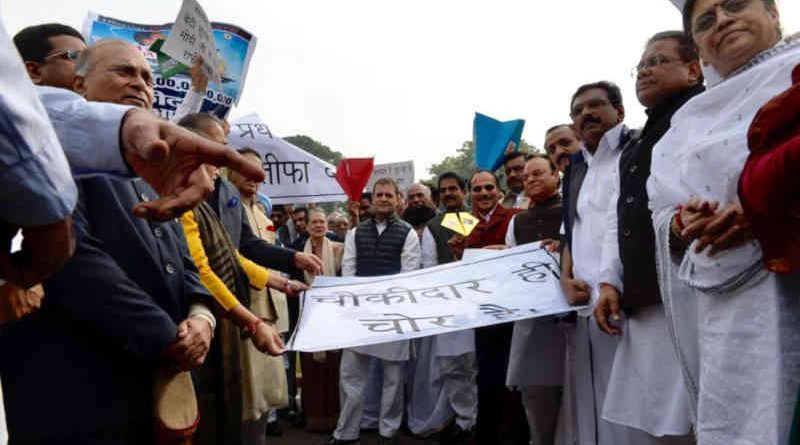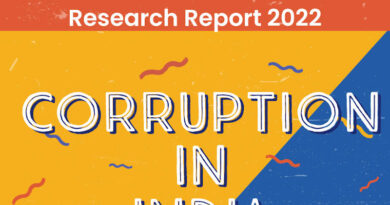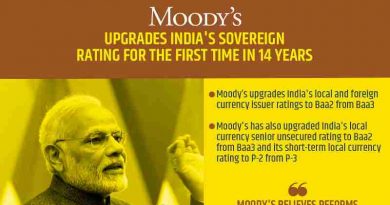French Judge to Lead Investigation into Rafale Corruption Case

Thanks to a series of investigative reports published by Mediapart about the possibility of corruption in the Rafale deal, the probe has been launched to examine various aspects of the deal.
By Rakesh Raman
As the Indian courts and judges have turned a blind eye to the possible corruption in the Rafale deal, a French judge has been appointed to lead a judicial investigation into alleged corruption and favouritism in the 7.8 billion euro sale to India of 36 fighter aircraft.
Mediapart – an independent French online investigative journal – revealed in its new report released on July 2 that the investigation was formally opened in June following a decision by the financial crimes branch of the French public prosecution services, the PNF. Parquet national financier (PNF) is a French judicial institution which is responsible for investigating serious economic and financial crimes.
Thanks to a series of investigative reports published by Mediapart in April 2021 about the possibility of corruption in the Rafale deal, the probe has been launched to examine various aspects of the deal. These include corruption, influence peddling, money laundering, favouritism, and undue tax waivers surrounding the deal.
Investigative reporter Yann Philippin of Mediapart reveals that after declining to investigate the case in 2019, the PNF has decided to open it after the case was updated with details from Mediapart’s recent series of investigations. The Wire news service published a video interview with Yann Philippin in April to learn about the Rafale case. [ Click here to watch the interview. ]
In its April 4, 2021 article headlined ‘Sale of French Rafale jet fighters to India: how a state scandal was buried’, Mediapart had reported that massive corruption happened in the Rafale deal, in which the Prime Minister (PM) of India Narendra Modi is the prime accused.
According to the article, in 2016 France and India signed a 7.8-billion-euro deal for the purchase of 36 Rafale jet fighters made by French defence group Dassault Aviation. Mediapart claims that alongside this controversial deal, Dassault also agreed to pay one million euros to a middleman who is now under investigation in India in connection with another defence deal.
The article adds that the French anti-corruption agency Agence Française Anticorruption (AFA) discovered this separate arrangement during a routine audit of Dassault, but the AFA decided not to alert the prosecution authorities over the payment. This was the first part of Mediapart’s investigation into a state scandal which also raises questions over both the justice system and the political authorities.
While the Rafale deal had become a hot potato in India, a French NGO named Sherpa had filed a complaint in 2018 with the National Financial Prosecutor’s Office to clarify under which conditions 36 fighter aircraft produced by Dassault Aviation were sold to India in 2016 and the choice of its Indian partner, Reliance, a group led by a close partner of PM Modi.
“This complaint follows the complaint lodged on the 4th of October 2018 by a former Indian Minister and an anti-corruption lawyer with the Central Bureau of Investigation (CBI) in New Delhi, against Modi for ‘abuse of authority’ and ‘grant of undue advantages’ in connection with the sale of Rafale, and the facts revealed by Mediapart and Sherpa’s investigation,” Sherpa said in a statement about the Rafale case.
The Sherpa statement added that Anil Ambani, Modi’s close associate; Eric Trappier, CEO of Dassault Aviation; and the former Indian Minister of Defense Manohar Parrikar have also been targeted in the complaint filed in New Delhi for “complicity” in the alleged crime.
As the Modi government has been hiding the facts related to the Rafale deal, a Times of India article of August 21, 2020 said that the federal auditor Comptroller and Auditor General (CAG) in its report did not mention any offset deals related to Rafale aircraft purchased from French company Dassault Aviation. The article adds that India’s Ministry of Defence (MoD) has denied any information related to the Rafale offset deals to the CAG.
RAFALE DEAL AND SUPREME COURT DECISION
In November 2019, the Supreme Court of India had put a final break on the controversial Rafale corruption case. A bench comprising the then Chief Justice of India Ranjan Gogoi, Justices S.K. Kaul, and K.M. Joseph dismissed the review petitions seeking reassessment of the judgment that had refused an investigation by the CBI into the Rafale fighter jet deal with French firm Dassault Aviation.
A petition filed by Aam Aadmi Party (AAP) leader and Rajya Sabha member Sanjay Singh was seeking a court-monitored investigation into the Rafale deal. Another petition filed by former Indian ministers Yashwant Sinha, Arun Shourie, and lawyer-activist Prashant Bhushan had demanded a review of its findings related to the procurement of 36 Rafale fighter jets.
However, the top court observed that the petitions lacked merits and therefore there is no need for the CBI to register a first information report (FIR) and start the inquiry.
It is important to mention here that in May 2019 a Supreme Court committee had exonerated Chief Justice Gogoi who was blamed of sexual harassment by a former woman employee of the court. Most observers believe that the so-called inquiry was a biased exercise to protect the Chief Justice and the committee did not follow the law to protect women from sexual harassment at their place of work.
After giving a whimsical judgment that protected Modi and his colleagues in the Rafale case, Gogoi’s term as Chief Justice ended on November 17, 2019, and the Modi government rewarded him with a Rajya Sabha membership in March 2020.
RAFALE CASE COMPLAINT
The petitioners in the Rafale case – led by lawyer Prashant Bhushan – had filed a complaint with the CBI on October 4, 2018, urging the agency to register an FIR against PM Modi and former defence minister Manohar Parrikar.
The complaint alleged that the accused have committed a range of offences under the Prevention of Corruption Act (PC Act) over their April 2015 decision to purchase 36 Rafale aircraft from Dassault Aviation.
The complaint was handed over to Alok Verma, the then director of the CBI, who was later removed from his position surreptitiously by the Modi government with the help of Central Vigilance Commission (CVC), India’s top anti-corruption organization which controls CBI.
In a related development, K.V. Chowdary – who had retired as the Central Vigilance Commissioner – was hired as additional director on the board of Reliance Industries Limited (RIL) led by Mukesh Ambani, who is a close capitalist friend of Modi. As the CVC of India, Chowdary had intervened to get all investigations against Modi dropped.
Chowdhary was gifted the post of CVC in 2015 for his role in protecting Modi unscrupulously. Despite a number of corruption complaints against Chowdary, he goes scot-free because there is no specific law to prosecute him. According to an RTI reply, four complaints were filed against Chowdary between January 2014 to August 2020.
A new CVC Sanjay Kothari – who was handpicked in April 2020 – was equally notorious, as he ignored the Rafale case. The office of the CVC is an utterly useless setup which protects the corrupt government functionaries instead of catching and punishing them.
It is alleged in the complaint that Modi – who is a public servant – misused his position as PM of India to give undue benefit in the Rafale deal to his close associate Anil Ambani who is the Chairman of Reliance ADA group of companies and brother of Mukesh Ambani. When the complaint reached India’s top investigating agency CBI, Chowdary allegedly conspired to get CBI director Alok Verma removed from his position.
MURKY COURT JUDGMENT
The New York Times (NYT), the world’s top newspaper based in the U.S., said in its article that Modi’s opaque arms deal has raised some serious questions. The article headlined “With ‘Fishy’ Jet Deal, India’s Opposition Finally Lands a Blow on Modi” appeared in NYT.
It raised questions such as why Modi renegotiated a deal for 36 fighter jets and why a company run by a wealthy family (Ambani family) was chosen to participate in the deal while it had no experience of building jets. The NYT article also asked why the costs of the planes seemed to jump so much and why Modi is not sharing more details on the Rafale deal.
Strangely, however, the Supreme Court did not find the need to explore all these troubling questions and gave a murky judgment in favor of the Modi government.
The petitioners had alleged that the 2018 judgment “relied upon patently incorrect claims made by the government in an unsigned note given in a sealed cover” to the Supreme Court. In order to see transparency in the decision-making process of the court, they had requested for an oral hearing of the petition in an open court.
But instead of dealing with the case objectively, the Supreme Court judges – it appears – merely used their whims to dismiss it because the case targeted PM Modi. The less said about the Indian courts, the better.
In order to highlight corruption in the Rafale deal, Congress leader Rahul Gandhi used ‘chowkidar chor hai’ (PM Narendra Modi as watchman of the country is a thief) slogan extensively before the 2019 Lok Sabha election to discredit Modi for his alleged involvement in the deal.
Rahul Gandhi often called Modi a “thief” for stealing Rs. 30,000 crore (~ US$ 4 billion) in the Rafale deal which was handled by Modi in a shady manner.
But after the court judgment, Rahul Gandhi and the petitioners had to willy-nilly accept that there was no corruption in the Rafale deal and Chowkidar Modi is not a chor.
But the new Mediapart articles have again brought the Rafale scandal to the center stage of increasing political corruption in India. According to its article, in New Delhi on September 23rd 2016 the French minister for defence, Jean-Yves Le Drian, and his Indian counterpart Manohar Parrikar, watched by Éric Trappier, CEO of French company Dassault Aviation, signed one of the biggest arms deals ever concluded by the French state.
|
Complicit Anti-Corruption Agencies of India The anti-corruption agencies in India are either scared of the government politicians or complicit in crimes being committed by bureaucrats and politicians. That’s why they simply ignore the corruption complaints against government functionaries. Moreover, the investigating officers are so unskilled and almost illiterate that they cannot understand the complaints. As a result, there are inordinate delays in resolving the corruption cases or the culprits never get punished. – Rakesh Raman |
This was for the sale of 36 Rafale fighter jets – made by Dassault – to the Indian state for 7.8 billion euros. To put this sum into context it is the equivalent of the annual gross domestic product (GDP) of a country such as Benin in West Africa.
Although Mediapart has again revealed corruption in the Rafale deal, instead of allowing a transparent investigation into the case, the Modi government will dismiss the report by saying that it is a politically motivated attempt to malign the Modi government. There is also a possibility that the Modi government will intimidate Mediapart by sending a frivolous legal notice to the journal for its Rafale corruption report.
As expected, the Modi government dismissed the new Rafale investigation report on April 5, saying it is a baseless report and blamed the opposition party Congress and ‘corporate rivalry’ for accusing Modi and his government. But the Modi government has not given any solid argument in its defence. [ Click here to watch a related video. ]
Since the opposition parties in India are almost extinct and the courts as well as anti-corruption outfits such as the Lokpal, CVC, and CBI are mostly complicit in state crimes, the Rafale scandal will once again be brushed under the carpet.
The Congress party, however, held a casual press conference on July 3 to explain the irregularities in the Rafale deal. As Congress is a dying political outfit, it shows its opposition only through Twitter instead of holding field demonstrations or going to the courts against the Modi government’s questionable actions.
Meanwhile, a new report released by the U.S. Department of State has revealed that widespread corruption is happening at all levels of government in India.
The report released on March 30 says that the law provides criminal penalties for corruption by government officials, but most government officials frequently engage in corrupt practices with impunity. There were numerous reports of government corruption during the past year, the report says.
By Rakesh Raman, who is a national award-winning journalist and social activist. He is the founder of a humanitarian organization RMN Foundation which is working in diverse areas to help the disadvantaged and distressed people in the society.





